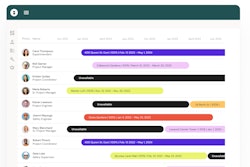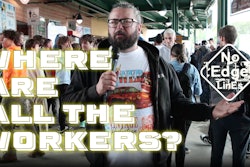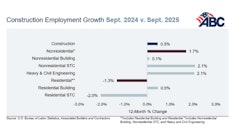
It is no secret U.S. college education is pricey and often leaves crushing debt in its wake. This spells opportunity for a construction industry that provides attractive alternatives to four-year institutions as it brings a new generation of talent into the fold.
I’m part of that generation – Generation Z – a cohort born roughly between about 1997 and 2012. Courting this cohort is critical, given the ongoing construction-industry labor shortage, which 58% of respondents of a recent industry survey described as “severe” or “very severe.” Add to that the ongoing “silver tsunami” of retirements in a business where one in five workers are 55 or older.
Gen Z will be backfilling those roles regardless – this is a critical industry, and demographics will prevail. But what sort of Gen-Z talent will do that backfilling – because you want the best, right?
University-level construction management and engineering programs will continue to be vital feeders. But so many diamonds in the rough are dissuaded from higher ed by limitations ranging from the financial to the dispositional (i.e., not wanting to sit in a classroom for four more years). They could do great work and rise to industry leadership if given the chance.
Two realms of technology can help construction businesses reel Gen Z talent in and help them develop to their full potential. The first has to do with technologies increasingly involved in getting construction jobs conceived, designed, and completed more quickly, safely, and efficiently. The second involves technologies that help recruit, train, and retain the people at the heart of those efforts.
 Training progress feeds into cloud-based, increasingly AI-augmented HR systems that not only manage recruiting and onboarding, but also provide holistic views of an employee’s skills, work history, performance, certifications, and interests.@Monkey Business - adobe.stock.com
Training progress feeds into cloud-based, increasingly AI-augmented HR systems that not only manage recruiting and onboarding, but also provide holistic views of an employee’s skills, work history, performance, certifications, and interests.@Monkey Business - adobe.stock.com
AI, New Tech Appeal to Gen Z
It’s no secret that Gen Z is into technology. The oldest of us were in elementary school when the iPhone emerged; the youngest of us were that age when TikTok exploded onto the scene. We were born in the digital world, and we have coevolved with it.
When it comes to job-related technology, the construction industry has it – Building information modeling (BIM), liDAR, drones, and, increasingly, AI that touches all aspects of the business and the projects it develops. It’s time to flaunt it.
Consider AI’s impact. AI can turn pencil sketches into workable design options. By supercharging BIM, AI can assess design data and optimize layouts while taking into account cost, schedule deadlines, space utilization, energy efficiency, and sustainability considerations ranging from sun angles to building materials. AI analysis of worksite drone and fixed-camera data will soon enable auto-generated updates of progress for work packages and trades. Generative AI copilots can answer questions and make recommendations throughout the process. And so on. Not only are AI and other technologies revolutionizing the construction business, but Gen Z also wants to work with them. That’s win-win.
HR and Training Tech Helps Employees Grow
HR and training-related technologies are no less important. Say the industry aims to bring in high-potential but still raw Gen Z talent who opt for trade school or associate-degree tracks rather than four-year programs. That will require training to bring them up to speed along technical and job-related lines, as well as developing their soft skills related to communication, time-management, and leadership. The good news is that self-paced, highly leveraged online training – be it related to task-specific microlessons or certificate courses – aligns with how Gen Z prefers to learn anyway.
Training progress feeds into cloud-based, increasingly AI-augmented HR systems that not only manage recruiting and onboarding, but also provide holistic views of an employee’s skills, work history, performance, certifications, and interests. For employees, these systems can recommend learning opportunities, mentors, temporary assignments, and more. While those features are more about employee retention, to retain is to recruit – not only by easing the need to bring in new people, but also by demonstrating that yours is a company that cares about the professional and personal development of its people. Word gets out.
Construction is Solving Big Problems
Finally, in attracting high-potential Gen Z talent, cultural messaging can’t be ignored. Gen Z grew up in a world of creeping crises that call for grassroots solutions, and we generally want to be a part of those solutions. The construction industry is playing a vital role in addressing two major issues, and it shouldn’t be shy about advertising that fact to young people.
The high cost of housing cost is a huge problem, and it affects Gen Z in particular, as rents skyrocket and entry-level housing prices climb out of reach. The problem is obvious: Demand vastly outstrips supply. The country needs an estimated 4 million to 7 million more housing units already, and population growth continues.
On the climate front, buildings account for more than one-third of U.S. greenhouse gas emissions, and the construction business is hard at work to minimize emissions as energy-efficiency efforts and green-building techniques go mainstream.
Digital technologies are playing indispensable and growing roles in building faster, better, and more efficiently in ways that address the housing shortage and climate change. These issues affect Gen Z directly, and our affinity for technology and our desire to make the world a better place make the construction industry an especially attractive career option.
This business may go back millennia, but it’s not designing pyramids based on papyrus drawings anymore. It’s solving problems that matter to Gen Z using technologies that fascinate Gen Z at a time when college costs have gone stratospheric. This is a great business and a societally impactful one. A wide swath of my generation’s best minds will be interested in pursuing careers in it – if the industry plays its cards right.



















